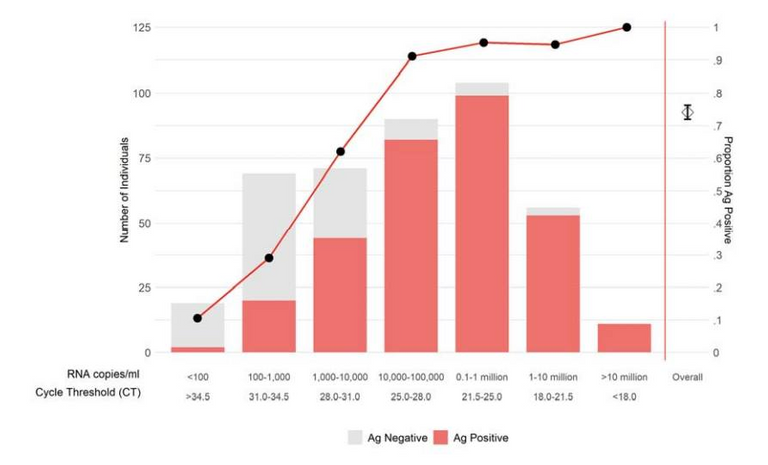
- It looks like booster shots are working really well against Delta infections (not just hospitalizations), with three Pfizer shots granting 95% protection against infection in field studies in Israel. This level of protection is as good as the standard two-shot course was against the original COVID. I got a third Moderna shot in August when there were soon-to-expire doses piling up unused and appointments were wide open (and thus we felt ethically OK that we weren't taking the shot away from someone who needed it more). There's no population-scale study on what happens if you get three Moderna shots, but it likely conveys even better protection than three Pfizer shots.
- Rapid antigen tests are much better than I thought for the usecase of screening attendees at an event that lasts a few hours. I was down on them earlier this year because their sensitivity at detecting infection is low, but it turns out their sensitivity at detecting whether someone is both infected and contagious is much higher. For very high viral loads, sensitivity is close to 100% and issues like not performing the test properly start to become the main reason these infections aren't detected. Michael Mina (the epidemiology professor, not the chef) claims that rapid tests are ~97% sensitive at detecting viral loads that are high enough to transmit, but I looked at the papers he linked to and I'm unsure how he comes to that conclusion. However, I would roughly guess it's unlikely that the sensitivity is lower than maybe 80% at detecting people who are infected and contagious based on the graph of viral load I found in one of the papers he linked to. To all of you who organized events earlier this year where you rapid-tested everyone at the start and then proceeded without further precautions, you were actually doing the right thing and I apologize for saying these tests were only a 2x risk reduction.
Paper on sensitivity vs viral load (from Jan 2021, so I could have found this months ago but didn't!):
https://www.medrxiv.org/content/10.1101/2021.01.13.21249563v2
My updates at this point are:
With a booster, my COVID exposure risk for any activity is maybe 1/3 of what Microcovid says for a fully vaccinated person. This lets me do a good bit more than I'm doing right now.
Everyone who's fully vaccinated should get a booster when it's available as opposed to waiting for some Delta-specific booster in a few months.
I'll feel very safe at indoor events where they antigen-test everybody on arrival (unless the event lasts several days, in which case people should get an antigen test every day.
At this point, my main concern with COVID is long COVID as opposed to acute infection, as I'm young enough that an acute infection as a vaccinated person would be relatively mild.
I'm glad you're doing your research. Unfortunately, the research is polarizing on the vaccine. https://www.theblaze.com/op-ed/horowitz-harvard-researcher-finds-absolutely-no-correlation-between-vax-rates-and-covid-cases-globally is a Harvard study (not that it matters that it came from Harvard, but some people think that makes it legitimate) that has found that vaccine rates haven't proven to be as effective as the vaccine creators publish...
I didn't get the vaccine. I got the antibodies instead through natural infection. I don't mind if people get the vaccine as long as they're fully informed before getting it. Learn all you can, then make a wise decision with the info you have... that's what I say. For me, I couldn't trust studies on efficacy when the virus had only been out 12 months, supposedly... really? How can you tell me the long term benefits will be there when it's something never fully experienced before other than in less legal Corona versions...
Thanks for sharing!
I absolutely respect your freedom to choose how to navigate the current environment, and my personal bias does not preclude anyone to following anything I share or say.
Like you correctly said, making informed decisions for yourself is probably the best anyone should expect and with that, we can expect as a society for people to come to different conclusions about whether to take the vaccine. Totally fine.
I will say, though, in a public health crisis, waiting something like 10 years + for all the clinical trials and approvals to go through would likely be too long - then again, that's still assuming that the long term benefits outweigh the (yet to be determined) side effects.
You have sound reason. Of course there are other factors at play, at least in my situation. I am able to work remotely so I rarely see anyone but my family except one a week for groceries. When the pandemic hit and there was no vaccine we were careful and stayed home for 3 weeks. We already had food and toilet paper, etc to last. We were prepared. As news came out that the survival rate was 98%+, I was no longer worried about it. Of course, that survival rate is even higher now, as I understand it. I was exposed to it in March 2020 and contracted it for sure last month. My whole family came out unscathed as most do.
We all have to pay attention to the data and make the best decisions. Because we could bunker down we felt at ease. By the time the vaccine was released, my family had already lost our masks and traveled 6000 miles on a cross country trip, having the best time of our lives in all the touristy spots others were too scared to visit. Having gone through it and survived easily, we're more convinced than ever that we're totally ready to face it again. I'm very grateful for those who have taken the vaccine! They're in the largest medical trial ever. Results will continue to be seen over the next 5 years or so. There will be a lot to learn from this! Especially how many are willing to give up their freedom for perceived security.